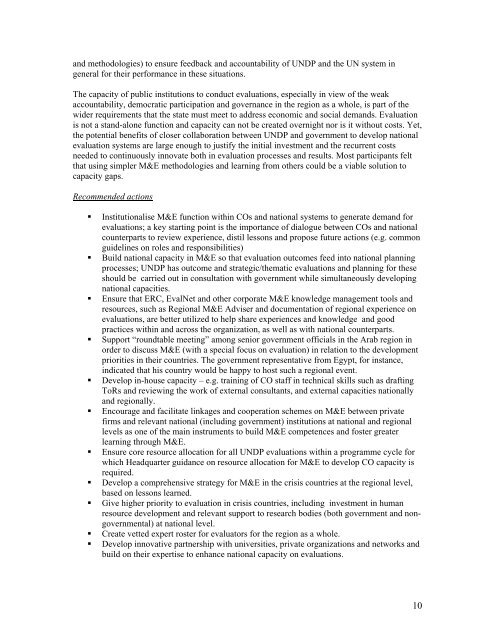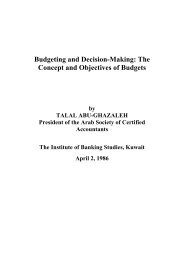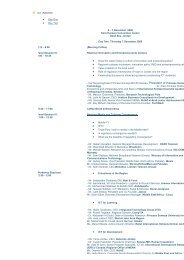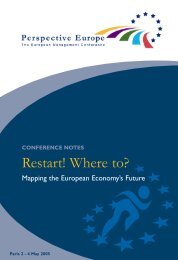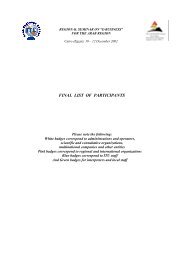Regional Workshop on the UNDP Evaluation Policy Arab States
Regional Workshop on the UNDP Evaluation Policy Arab States
Regional Workshop on the UNDP Evaluation Policy Arab States
You also want an ePaper? Increase the reach of your titles
YUMPU automatically turns print PDFs into web optimized ePapers that Google loves.
and methodologies) to ensure feedback and accountability of <strong>UNDP</strong> and <strong>the</strong> UN system in<br />
general for <strong>the</strong>ir performance in <strong>the</strong>se situati<strong>on</strong>s.<br />
The capacity of public instituti<strong>on</strong>s to c<strong>on</strong>duct evaluati<strong>on</strong>s, especially in view of <strong>the</strong> weak<br />
accountability, democratic participati<strong>on</strong> and governance in <strong>the</strong> regi<strong>on</strong> as a whole, is part of <strong>the</strong><br />
wider requirements that <strong>the</strong> state must meet to address ec<strong>on</strong>omic and social demands. Evaluati<strong>on</strong><br />
is not a stand-al<strong>on</strong>e functi<strong>on</strong> and capacity can not be created overnight nor is it without costs. Yet,<br />
<strong>the</strong> potential benefits of closer collaborati<strong>on</strong> between <strong>UNDP</strong> and government to develop nati<strong>on</strong>al<br />
evaluati<strong>on</strong> systems are large enough to justify <strong>the</strong> initial investment and <strong>the</strong> recurrent costs<br />
needed to c<strong>on</strong>tinuously innovate both in evaluati<strong>on</strong> processes and results. Most participants felt<br />
that using simpler M&E methodologies and learning from o<strong>the</strong>rs could be a viable soluti<strong>on</strong> to<br />
capacity gaps.<br />
Recommended acti<strong>on</strong>s<br />
• Instituti<strong>on</strong>alise M&E functi<strong>on</strong> within COs and nati<strong>on</strong>al systems to generate demand for<br />
evaluati<strong>on</strong>s; a key starting point is <strong>the</strong> importance of dialogue between COs and nati<strong>on</strong>al<br />
counterparts to review experience, distil less<strong>on</strong>s and propose future acti<strong>on</strong>s (e.g. comm<strong>on</strong><br />
guidelines <strong>on</strong> roles and resp<strong>on</strong>sibilities)<br />
• Build nati<strong>on</strong>al capacity in M&E so that evaluati<strong>on</strong> outcomes feed into nati<strong>on</strong>al planning<br />
processes; <strong>UNDP</strong> has outcome and strategic/<strong>the</strong>matic evaluati<strong>on</strong>s and planning for <strong>the</strong>se<br />
should be carried out in c<strong>on</strong>sultati<strong>on</strong> with government while simultaneously developing<br />
nati<strong>on</strong>al capacities.<br />
• Ensure that ERC, EvalNet and o<strong>the</strong>r corporate M&E knowledge management tools and<br />
resources, such as <str<strong>on</strong>g>Regi<strong>on</strong>al</str<strong>on</strong>g> M&E Adviser and documentati<strong>on</strong> of regi<strong>on</strong>al experience <strong>on</strong><br />
evaluati<strong>on</strong>s, are better utilized to help share experiences and knowledge and good<br />
practices within and across <strong>the</strong> organizati<strong>on</strong>, as well as with nati<strong>on</strong>al counterparts.<br />
• Support “roundtable meeting” am<strong>on</strong>g senior government officials in <strong>the</strong> <strong>Arab</strong> regi<strong>on</strong> in<br />
order to discuss M&E (with a special focus <strong>on</strong> evaluati<strong>on</strong>) in relati<strong>on</strong> to <strong>the</strong> development<br />
priorities in <strong>the</strong>ir countries. The government representative from Egypt, for instance,<br />
indicated that his country would be happy to host such a regi<strong>on</strong>al event.<br />
• Develop in-house capacity – e.g. training of CO staff in technical skills such as drafting<br />
ToRs and reviewing <strong>the</strong> work of external c<strong>on</strong>sultants, and external capacities nati<strong>on</strong>ally<br />
and regi<strong>on</strong>ally.<br />
• Encourage and facilitate linkages and cooperati<strong>on</strong> schemes <strong>on</strong> M&E between private<br />
firms and relevant nati<strong>on</strong>al (including government) instituti<strong>on</strong>s at nati<strong>on</strong>al and regi<strong>on</strong>al<br />
levels as <strong>on</strong>e of <strong>the</strong> main instruments to build M&E competences and foster greater<br />
learning through M&E.<br />
• Ensure core resource allocati<strong>on</strong> for all <strong>UNDP</strong> evaluati<strong>on</strong>s within a programme cycle for<br />
which Headquarter guidance <strong>on</strong> resource allocati<strong>on</strong> for M&E to develop CO capacity is<br />
required.<br />
• Develop a comprehensive strategy for M&E in <strong>the</strong> crisis countries at <strong>the</strong> regi<strong>on</strong>al level,<br />
based <strong>on</strong> less<strong>on</strong>s learned.<br />
• Give higher priority to evaluati<strong>on</strong> in crisis countries, including investment in human<br />
resource development and relevant support to research bodies (both government and n<strong>on</strong>governmental)<br />
at nati<strong>on</strong>al level.<br />
• Create vetted expert roster for evaluators for <strong>the</strong> regi<strong>on</strong> as a whole.<br />
• Develop innovative partnership with universities, private organizati<strong>on</strong>s and networks and<br />
build <strong>on</strong> <strong>the</strong>ir expertise to enhance nati<strong>on</strong>al capacity <strong>on</strong> evaluati<strong>on</strong>s.<br />
10


